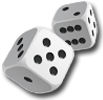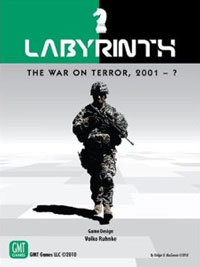



play board games
Board game reviews, strategy tips & session reports
Labyrinth The War on Terror Review
 Stats:
Stats:
No. of players: 1-2
Amount of time to play: 180 min
Age requirements: 12+
Set-up time: 10-15 minutes
Labyrinth The War on Terror Rules Description:
Labyrinth is a solo or two-player strategy war game that simulates the War on Terror. Given the sensitivity of this theme, GMT has done a great job implementing this game. You can decide if it is a game for you and I hope this review helps.
Labyrinth is card driven and at a first glance you might think it is like Twilight Struggle. But once you play Labyrinth, you’ll understand the differences. These games are cousins and some people may think distant ones at that.
You play as either the United States or Jihadists. Each side wants to influence the world so their ideals prosper. As the U.S. you try to stabilize governments in Muslim countries. If you are playing the Jihadists you want to influence these countries toward poor governance.
The game ends once you have played through the deck. Each Muslim has a resource value from 1 to 3. If the U.S. has twice as many resources under Good governance than are under Islamist rule, they win. If not, the Jihadists win.
Each side also has a few instant win conditions. The U.S wins if you can get 12 resources in countries with Good governance. If fifteen countries are at Fair or Good governance they U.S. player wins. Or if Jihadist cells have been removed from the board they win.
The Jihadists win if six resources are under Islamist rule and two of these countries are adjacent. If the U.S. Prestige drops to one and 15 or more countries are under Poor governance or Islamic rule, the Jihadists win. The U.S. Prestige value represents the world affinity towards the U.S. Lastly if the Jihadists launch a WMD Plot in the United States they instantly win.
Turns are broken into Action Phases. Each Action Phase you must play two cards (if you have them) staring with the Jihadist player. Your hand size is determined by funding for the Jihadists or troops deployed for the U.S.
You can play these cards for their Events or Operation Points. But each card you play that matches your opponent’s side will resolve its Event text.
Operation Points are used very differently based on which side you are playing. The number of Operation Points on a card by the U.S. determines which countries operations can be performed in. The worse the governance of a country the more points are needed. The U.S. can use Operation Points to better a country’s governance, deploy troops or disrupt cells with troops currently on the board, alert the world about a terror plot, or reassess the U.S. posture.
The cards the Jihadists play determine how many dice they roll when attempting operations. Most of the actions the Jihadists may take require a roll to succeed. Rolling more dice makes success more probable. The Jihadists may travel, have a Jihad to lessen governance, or place terror plots on the board.
The game can be played using three different play lengths and four different scenarios. These scenarios change the initial set-up of the board and might remove some Event cards.
Quick Labyrinth The War on Terror Review:
Labyrinth does an excellent blending theme and mechanics. As either player you will find yourself trying to guess what the next best move is and how to hurt your opponent most. There is tension, intrigue and at times confusion.
The components are great and Labyrinth looks very good. The rules are fairly well-written, but some areas could use some clarity and you’ll probably have to search for some answers.
The way the two different sides play is interesting, but is also a double edged sword. It adds some replay value to the game as you try out both sides. But since each side has its own rule set and mechanics, you almost need to learn the game again.
Labyrinth is a complex game. It has a lot of the depth of Twilight Struggle but not its elegance. Some turns you will be unsure what to do next and figuring out a winning strategy may take a few plays. There is also more dice rolling in Labyrinth. It is more chaotic than Twilight Struggle just as the War on Terror is more chaotic than the Cold War. But this will make some players feel they have less control to implement a winning strategy.
The theme and mechanics in Labyrinth integrate very well. The game is challenging, tense and fun. My caveat is that it will take some time to make it a lot of fun. If you are looking to try something similar to Twilight Struggle but would like a different theme, Labyrinth is not it. This is a very different game from Twilight Struggle. The added complexity creates a steeper learning curve. Once past that curve you should enjoy the ride, but you will need to have some patience and fortitude. The learning curve also puts new players at a disadvantage and makes it hard for you to find new people to play with.
The solo play variant is only playable as the U.S. and the flowchart for the Jihadists is very complicated. I found playing solo to be rather cumbersome. But just as with the regular game if you try it enough, I am sure you’ll be rewarded.
If you are thinking of purchasing Labyrinth you might want to try it first. If you are a fan of card-driven war games and don’t mind all the dice rolling you should enjoy this too.
Score and synopsis: (Click here for an explanation of these review categories.)
Strategy 5 out of 6
Luck 4 out of 6
Player Interaction 6 out of 6
Replay Value 4 out of 6
Complexity 6 out of 6
Fun 4 out of 6
Overall 4 out of 6

Leave a Reply